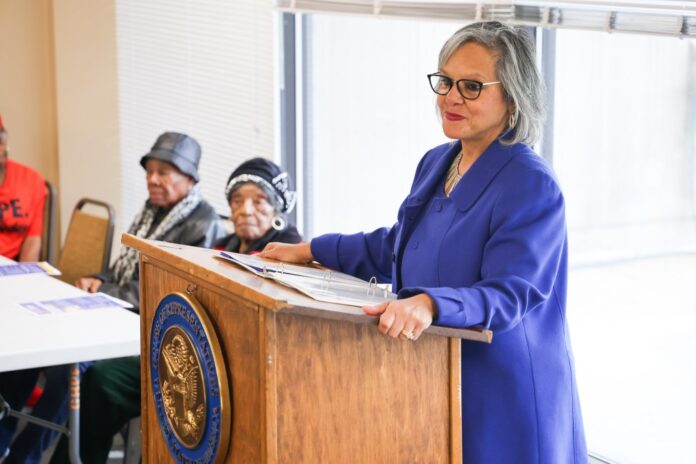
It’s despicable — predators financially exploiting seniors and defrauding them out of part or all of their life savings. The problem is widespread, say senior advocates, who welcome bipartisan legislation introduced by U.S. Rep. Robin Kelly, Matteson Democrat, to help combat it.
Older adults reported losing more than $1.6 billion to fraud in 2022, according to the Federal Trade Commission report, “Protecting Older Consumers, 2022-2023, A Report of the Federal Trade Commission.” But the FTC estimates the overall cost to be as high as $48 billion because the vast majority of frauds are not reported.
The report also noted in 2022, older adults reported significantly higher losses to these scams than they did in 2021:
• $404 million due to investment scams, up 175% from 2021
• $271 million due to business impersonation scams, up 78% from 2021
• $159 million due to tech support scams, up 117% from 2021.
“The problem is not getting better; it’s getting worse,” said Kelly. “It’s horrible.”
If seniors are living alone, they may not have family or friends they can discuss things with to help them avoid becoming victims, which makes it even more difficult, Kelly said. Meanwhile, many of the scams often harm entire families, she noted.
The Protecting Seniors from Emergency Scams Act, introduced by Kelly and U.S. Rep. Troy Balderson, an Ohio Republican, in April, would require the Federal Trade Commission to update its web portal with information about scams targeting seniors to allow consumers to search for scams by region and access contact information for law enforcement and adult protective service agencies.
The legislation also would also direct the FTC to work with media outlets and law enforcement agencies to distribute the information to seniors and their caregivers. It directs the FTC to issue a report on the types of scams seniors face and the frequency of the scams.
“We have a moral obligation to stop these con artists by empowering seniors with facts and information and empowering the FTC to understand how these criminal operations start and prevent them from continuing,” Kelly said.
The legislation has been endorsed by AARP, the Elder Justice Coalition and the American Society on Aging, according to Kelly’s office.
Increasing awareness is key, said Elaine Grande, executive director of Palos Heights-based eldercare services provider Pathlights.
“If this act can do that, I think it’s a good step because these scammers are smart and sophisticated and they are smooth,” she said. “They can get to any of us. It’s really hard when (seniors) are such a vulnerable population that they are targeting.”
Grande shared the story of two victims, one defrauded of roughly $100,000 and the other of roughly $80,000 through tech support scams in which they allowed the perpetrators to access their computers. Neither victim has recovered the funds. When money is exchanged it’s typically impossible to recover it, advocates say.
According to the FTC Consumer Sentinel Network Databook 2023, the top 10 reported fraud categories were:
• imposter scams
• online shopping and negative reviews
• prizes, sweepstakes and lotteries
• investment related
• business and job opportunities
• internet services
• telephone and mobile services
• health care
• travel, vacations and timeshare plans
• foreign money offers and fake check scams
Grande worries the emergence of artificial intelligence will only increase the number of victims and losses.
Adults are particularly vulnerable to scams, in part due to loneliness and social isolation, said Diane Slezak, president and chief executive officer of AgeOptions, the Area Agency on Aging for suburban Cook County.
“I think that’s a driver behind romance scams,” she said.
Romance scams topped the list of the most costly scams for older Americans in 2020, according to the FTC, and they remain a major problem, advocates note.
“I have heard anecdotally of people contacted through local social groups …someone new that shows up in a church group, befriends them, gets connected and scams them,” Slezak said.
For many seniors on the dementia spectrum, judgment can be among the first abilities to become impaired, she said, and that can make seniors easier targets.
AgeOptions has focused on financial scams at recent meetings of its Advocacy Task Force group, which is comprised of organizations that assist seniors. A representative from Kelly’s office is scheduled to discuss Kelly’s proposed legislation at a meeting of the task force group this week.
“Trying to do something on the prevention side is very important,” Slezak said. “How do you make sure you’re going to catch it.”
Slezak and Grande noted seniors often don’t report being exploited because they are embarrassed. But when they do report, they reveal losing substantially more than younger adults. Median losses were $1,450 for adults ages 80 and older and $803 for adults ages 70 to 79, compared to $450 for adults ages 20 to 29, according to the FTC’s Consumer Sentinel Network Databook 2023.
Pathlights has held workshops at community banks in the south suburbs to help educate and protect seniors and partners with the Cook County sheriff’s office, said Grande.
Among her advice to seniors, “If you’re suspicious or not certain it’s a credible person on the other end of the phone, just hang up, or say send me the information via mail or I will take your number and call you back.”
Grande also warns it’s a red flag if anyone asks for access to your computer.
“They may be really skilled and quite convincing,” she said. “It’s best to say I will call back, or I will check with my son or daughter, whoever it may be.”
To become informed and to report financial abuse, there are government resources.
Visit www.consumerfinance.gov/consumer-tools/fraud/, consumerfinance.gov/olderamericans, consumerfinance.gov/askcfpb or consumerfinance.gov/complaint/
Residents may also email [email protected] or call 855-411-2372.
Francine Knowles is a freelance columnist for the Daily Southtown. She is also a grants specialist at Chicago-based CJE SeniorLife, which receives funding from AgeOptions, and is a member of AgeOptions Advocacy Task Force.



